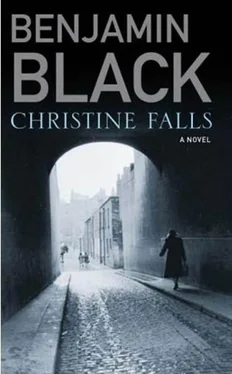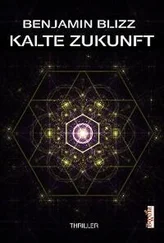Andy Stafford had climbed into the car and was just about to light a cigarette. He put it away hastily when he saw them turn back, Quirke swiveling abruptly on his stick like some sort of huge mechanical toy man. In the rearview mirror Andy caught a glimpse of his own reflection and was startled by what he saw, the somehow grimacing face with its dark, furtive eye. He studied Phoebe through the windshield as she approached, the wind molding her coat against her form. When she had got into the car he had tried to spread the tartan lap blanket over her knees but she had taken it from him without giving him even a glance and tossed it over her shoulder into the back window space. Now he listened idly to the two of them talking behind him as the car lurched down the track away from the dunes on its voluptuously squashy suspension.
“How did you meet up,” Phoebe was asking, “the four of you?”
Quirke, his hands set atop his stick, was watching the dwindling shore through the side window.
“Your grandfather had fixed for Mal and me to work at the hospital,” he said. “Summer jobs, you know, with a view to something more permanent, if it worked out, which it didn’t, for various reasons.”
“Delia being one of them?”
He shrugged.
“I might have stayed. Big bucks, even in those days. But then…” He let it drift away. He had the feeling that he was lying even though he was not; the secret that he carried was suddenly infecting everything. “Your grandmother was there, being treated, at the hospital. Sarah came to see her. She didn’t know her mother was dying. I was the one who told her. I think she was glad-to be told, I mean. Then we were a foursome for a while, Sarah, Delia, Mal, me.”
He stopped. Big bucks. A foursome. What was it-was he hoping the momentum of mere talk would lead him to blurt out another, altogether different word, would lull him into telling her without his intending it the things he had not the nerve to utter straight out, the things it was her right to know? He saw she was no longer listening to him, but was gazing out blankly through the window on her side as the car gained the main road and turned in the direction of North Scituate. Quirke studied the back of Andy Stafford’s head, sleek as a seal’s and narrow at the neck, and pondered how unmistakable it was, the physiognomy of the poor, the low, the dispossessed. Phoebe’s voice startled him.
“Rose wants me to stay here.”
She spoke in a sort of sighing fall, pretending weary indifference.
“Here?” he said.
She glanced at him archly. With his hands folded like that on the handle of the walking stick he had the distinct look of Grandfather Griffin.
“Yes,” she said, “here. In America. In Boston.”
“Hmm.”
“What do you mean, Hmm ?”
He looked again at the back of the driver’s head, uncannily motionless in the moving car. He lowered his voice but spoke with a deliberate emphasis.
“I don’t think that’s a good idea.”
“And why not?” she inquired.
He thought for a moment. What was he to say? After all, why should she not stay here? Why should she not do anything she wanted? Who was he to advise her how to live her life?
“What about home?” he said. “What about Conor Carrington?”
She made a wry face and turned to look out her window again. There was the church with the white spire they had passed by last night in the mist-hung darkness; today it looked ordinary and even a little sheepish, as if its ghostly nocturnal springing up were a prank it was ashamed to be reminded of in daylight.
“Home,” Phoebe said quietly, “feels very far away, here. I don’t mean just in miles.”
“It is far away,” Quirke said, “in miles and everything else. That’s the point.” He paused, floundering, then tried again. “I promised your-I promised Sarah I’d look after you. I don’t think she’d want you to stay here. In fact, I know she wouldn’t.”
“Oh?” she said, turning again to stare at him superciliously down her nose, and for a second he saw how she would look when she was middle-aged, a slightly less hard-eyed, less imperious Delia. “Just how do you know she wouldn’t?”
He felt a pressure inside his chest-was it anger?-and had to pause again. He was acutely aware now of the back of Andy Stafford’s head, which seemed to have become a bulbed and shiny listening device. He made his voice go lower still.
“There are things you don’t know, Phoebe,” he said. She was still fixing him with that ingenuously haughty stare.
“What things?” she said scoffingly. “What sort of things?”
“About your mother. About your parents.” He looked away. “About me.”
“Oh, you,” she said, softening suddenly, and laughed. “What’s there to know about you?”
WHEN THEY CAME INTO THE VILLAGE HE TOLD ANDY STAFFORD TO stop and levered himself on his stick out of the car, saying there was a place he wanted to find, a bar, where he used to drink when he first came here. Phoebe said she would come with him but he waggled his stick impatiently and told her no, that she should go on to the house and send the car back for him in an hour, and he slammed the door. She watched him lurch away, his long coat billowing and his hat in his hand and his hair shaking in the icy wind. Andy Stafford said nothing, letting the engine idle. The quiet in the car seemed to broaden, and something unseen began to grow up out of it and spread its indolent fronds.
“Take me somewhere,” Phoebe said crisply. “Anywhere.”
He palmed the gearshift and she felt a greased meshing as he let out the clutch and the car glided away from the curb with an almost feline stealth, purring to itself. She had turned aside to look out her window but she could feel him watching her in the mirror, and she was careful not to let her eye meet his. They whispered along the empty broad main street of the icebound village- Joe’s Diner, Ed’s Motors, Larry’s Tackle and Bait: it seemed the men owned everything here-and then they were on the coast road again, from which despite its designation she could catch only occasional glimpses of the sea, iron-blue and somehow tilted up toward the horizon. She did not like the sea, its unnatural uniform flatness, its worrisome smells. Untidy, tracklike roads led down to it, the continent petering out along this ragged eastern coastline. She experienced a sudden flush of weariness, and for a second her head nodded unstoppably and her eyelids came down like two curved, leaden flanges that had suddenly been attached to her eyes. She snapped herself upright, blinking. The driver was looking at her again in the mirror-should she tell him please to concentrate on the road? She wondered if his eyes, small and glossy brown, like a squirrel’s, she thought, and much too close together, were particularly lacking in expression, or if everybody’s eyes looked like that in isolation from the face’s other features. She leaned forward to check her own reflection but quickly sat back again, shaken by the sight of their two faces in the glass, suddenly beside each other but in different perspectives.
“So,” he said, “how do you like Boston?”
“I haven’t seen it, yet.” She had been determined to maintain a frosty distance, and was disconcerted to hear herself adding, “Maybe you’d take me there, sometime.” She faltered, and sat upright quickly, clearing her throat. “I mean, you might take Mr. Quirke and me, to see the sights, some afternoon.” She told herself: Shut up, you dope! “If my grandfather can spare you, that is.”
She could feel him being amused.
“Sure thing,” he said easily. “Anytime.” He paused, calculating how much he might risk. “Mr. Crawford don’t have much use for the car, him being sick and all, and Mrs. Crawford, well…” The very back of his head seemed to smirk. She wondered what that well might mean and thought it was probably best not to inquire. “You want to go to New York,” he said. “Now, there’s a real town.”
Читать дальше












